
Advances in Nano Research
metrics 2024
Charting New Paths in Nanoscience Discovery
Introduction
Advances in Nano Research, published by TECHNO-PRESS, is a prominent academic journal dedicated to advancing knowledge across various facets of nanoscience and nanotechnology. With its ISSN of 2287-237X and E-ISSN 2287-2388, this journal serves as a vital resource for researchers and professionals, focusing on areas such as Atomic and Molecular Physics, Biotechnology, Catalysis, Ceramics and Composites, and Electrical Engineering. Since its inception in 2017, the journal has notably achieved Q2 ranking in multiple categories for the year 2023, reflecting its commitment to high-quality research dissemination and its increasing influence in Scopus rankings, including ranks within the top 12% in Chemical Engineering. While Open Access options are currently unavailable, the rigorous peer-review process ensures that only the most impactful studies are published, further solidifying its importance within the academic community. As a significant player in the fields of engineering and materials science, Advances in Nano Research aims to foster innovation and collaboration, making it an essential publication for those engaged in cutting-edge research and development within the realm of nanotechnology.
Metrics 2024
 0.54
0.54 4.30
4.30 4.60
4.60 36
36Metrics History
Rank 2024
Scopus
IF (Web Of Science)
JCI (Web Of Science)
Quartile History
Similar Journals
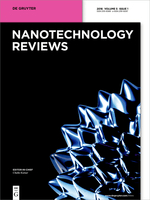
Nanotechnology Reviews
Empowering Global Research in NanoscienceNanotechnology Reviews, published by DE GRUYTER POLAND SP Z O O, stands at the forefront of the multidisciplinary field of nanoscience and nanotechnology. With an Open Access model adopted since 2019, this journal, identifiable by its ISSN 2191-9089 and E-ISSN 2191-9097, disseminates vital research that is accessible to a global audience. The journal is located in Germany and has established itself as a premier platform for innovative research, boasting impressive quartile rankings: Q1 across several categories including Biotechnology, Energy Engineering, and Materials Science, as well as a Q2 classification in Biomaterials as of 2023. The diverse scope enables authors to contribute to a range of topics, from biomedical applications to energy solutions and advanced materials, making it essential reading for researchers, professionals, and students passionate about cutting-edge developments. Additionally, with Scopus rankings highlighting its value across various domains and robust percentiles, including 94 in Engineering (miscellaneous), 93 in Medicine (miscellaneous), and 88 in Biotechnology, Nanotechnology Reviews is an influential and respected journal that fosters scientific dialogue and innovation.
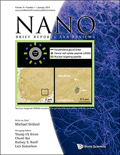
NANO
Transforming Insights into Nanotechnology AdvancementsNANO is an esteemed academic journal published by World Scientific Publishing Co. Pte Ltd, focusing on the frontier of nanoscience and nanotechnology. With ISSN 1793-2920 and E-ISSN 1793-7094, this journal has been a pivotal platform for disseminating innovative research from 2008 to 2024. Located in Singapore, NANO has established itself within the academic community, currently holding notable rankings in the Q3 Category for both Condensed Matter Physics and Materials Science, as well as a Q4 Category status in Nanoscience and Nanotechnology. Though it operates under a non-open access model, its contributions are invaluable for researchers, professionals, and students seeking to stay abreast of the latest advancements and interdisciplinary approaches within the nanoscale domain. By providing in-depth articles, reviews, and insights, NANO plays a significant role in advancing our understanding of materials at the nanoscale, thereby fostering innovation and collaboration across related fields.

Reactions is a dynamic open-access journal published by MDPI, dedicated to the advancement of research in the fields of Chemical Engineering and Chemistry. Launched in 2020, the journal aims to provide a platform for scientists and researchers to share their findings and innovations, facilitating the synthesis and dissemination of knowledge within the global academic community. With an impact factor that reflects its growing influence, Reactions ranks 47th in the Chemical Engineering category and 72nd in Chemistry on Scopus, placing it within the vibrant landscape of contemporary chemical research. Housed in the picturesque city of Basel, Switzerland, the journal is committed to open access, ensuring that its high-quality content is readily available to all. This commitment not only enhances visibility but also fosters collaboration among researchers, professionals, and students striving to push the boundaries of chemical sciences. As we look towards 2024 and beyond, Reactions continues to encourage submissions that explore groundbreaking methodologies, innovative applications, and transformative theoretical frameworks in chemistry and chemical engineering.

Nanoscience and Technology-An International Journal
Unveiling Breakthroughs in Nano Materials and PhysicsNanoscience and Technology-An International Journal, published by BEGELL HOUSE INC, is a leading platform dedicated to the rapidly evolving fields of nanoscience and nanotechnology. With its ISSN 2572-4258 and E-ISSN 2572-4266, the journal serves as a crucial resource for researchers, professionals, and students alike, focusing on advanced materials, condensed matter physics, and mechanics of materials. It holds a commendable position in the scholarly community, evidenced by its Q2 ranking in 2023 across multiple categories including Condensed Matter Physics and Materials Science. The journal aims to disseminate high-quality research, promote interdisciplinary collaboration, and facilitate innovation within the nano realm. With its convergence period from 2019 to 2024, it continues to attract a diverse array of studies and insightful contributions, reinforcing its importance in shaping the future of nanotechnology and its applications.

ADVANCED FUNCTIONAL MATERIALS
Connecting Researchers to the Future of Materials ScienceADVANCED FUNCTIONAL MATERIALS is a leading journal published by WILEY-V C H VERLAG GMBH, prominently recognized in the fields of biomaterials, chemistry, condensed matter physics, and materials science. With an impressive impact factor and a distinguished position in the Q1 quartile across multiple categories including nanoscience and nanotechnology, this journal serves as a vital platform for researchers and professionals committed to innovating in functional materials. Since its inception in 2000, ADVANCED FUNCTIONAL MATERIALS has published high-quality peer-reviewed articles that push the boundaries of materials science, exploring new frontiers in electronic, optical, and magnetic materials. The journal's dedication to open access ensures that its groundbreaking findings are readily available to a global audience, fostering collaboration and knowledge-sharing among scholars and practitioners in the field. For those seeking to stay at the forefront of materials research, ADVANCED FUNCTIONAL MATERIALS is an essential resource.

Discover Nano
Fostering Innovation through Collaborative ResearchDiscover Nano is a pioneering journal published by SPRINGER, dedicated to the rapidly evolving field of nanoscience and nanotechnology. Established in 2023, this innovative platform provides an open-access forum for researchers, professionals, and students to share and disseminate cutting-edge findings in materials science and condensed matter physics. With its commitment to accessibility, Discover Nano encourages a broad spectrum of contributions, aiming to foster collaboration and stimulate discussion in this dynamic area of study. As a new entry into the academic community, the journal holds great potential for growth, aspiring to increase its visibility and impact in the materials science arena, where it currently ranks in the bottom quartile for both materials science and physics categories. Based in Germany and reaching a global audience, Discover Nano represents a significant opportunity for those looking to shape the future of nanotechnology through impactful research and interdisciplinary dialogue.
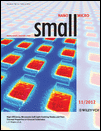
Small
Innovating Across Disciplines, One Small Step at a Time.Small is a premier academic journal published by WILEY-V C H Verlag GmbH, focusing on cutting-edge research across a multitude of disciplines including biomaterials, biotechnology, chemistry, engineering, materials science, medicine, and nanoscience. With an impressive impact factor and recognized in the top quartile (Q1) across these categories, Small serves as a vital platform for scientists and researchers aiming to disseminate innovative findings and explore the interplay between small-scale materials and their large-scale applications. Enjoying a broad readership, the journal has been key in advancing knowledge from its inception in 2005 and aims to foster collaborations and discussions that steer the future of material science and biotechnology. Though not open access, research published in Small remains invaluable for professionals and students eager to explore the advancements at the nanoscale, promoting a comprehensive understanding of modern scientific challenges and opportunities.

Carbon Trends
Transforming Knowledge into Carbon SolutionsCarbon Trends is a cutting-edge, openly accessible journal published by ELSEVIER, dedicated to advancing research and discussion in the domains of Chemistry, Materials Chemistry, and Materials Science. Established in 2020, this journal has quickly become a pivotal platform for scientists and researchers to share innovative findings related to carbon materials and their applications. With a solid impact factor and a ranking in the second quartile (Q2) across multiple subject categories, including a percentile standing in the top two-thirds of global publications, Carbon Trends plays an essential role in shaping the future of materials science. The journal’s open access model ensures that valuable research is accessible to a broad audience, facilitating collaboration and knowledge dissemination. Researchers, professionals, and students alike will benefit from the insights and trends published within its pages, guiding them in the rapidly evolving field of carbon sciences.
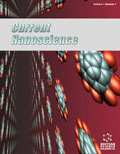
Current Nanoscience
Bridging Theory and Practice in NanotechnologyCurrent Nanoscience is a prominent journal published by Bentham Science Publishers Ltd, dedicated to advancing the field of nanoscience through the dissemination of high-quality research and review articles. Since its inception in 2006, the journal has provided a platform for innovative studies across a variety of related disciplines, including bioengineering, biomedical engineering, biotechnology, and nanotechnology, reflecting its diverse scope and interdisciplinary nature. With a Q3 ranking in several categories such as Biomedical Engineering and Pharmaceutical Science and a Scopus percentile ranking around the 60th in its field, Current Nanoscience serves as a vital resource for researchers and professionals seeking to stay abreast of the latest developments and breakthroughs. Although it operates without an open access model, the journal maintains a commitment to enhancing accessibility and relevance in the scientific community. The editorial team is focused on publishing articles that address both theoretical and practical aspects of nanoscience, ensuring that the findings contribute to knowledge and innovation in areas critical to technology and healthcare.
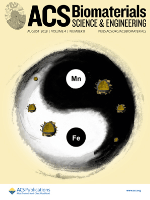
ACS Biomaterials Science & Engineering
Fostering Innovation Through Rigorous Research and CollaborationACS Biomaterials Science & Engineering, published by the American Chemical Society, serves as a premier platform for the latest advancements and research in the fields of biomaterials and biomedical engineering. With an impressive impact factor and a strong reputation reflected in its ranking—Q2 in Biomaterials and Q1 in Biomedical Engineering—the journal attracts a diverse and engaged readership. Since its inception in 2015, it has aimed to foster innovation by publishing high-quality research articles, reviews, and perspectives on the synthesis, characterization, and application of biomaterials. Researchers and professionals benefit from the journal's rigorous peer-review process and its focus on translational science, making it essential for those looking to stay at the forefront of biomaterials research. Located in Washington, DC, USA, the journal plays a pivotal role in connecting academic and industrial sectors, ultimately driving advancements that impact biomedicine and related fields.